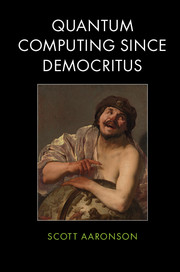Book contents
- Frontmatter
- Dedication
- Contents
- Preface
- Acknowledgments
- 1 Atoms and the void
- 2 Sets
- 3 Gödel, Turing, and friends
- 4 Minds and machines
- 5 Paleocomplexity
- 6 P, NP, and friends
- 7 Randomness
- 8 Crypto
- 9 Quantum
- 10 Quantum computing
- 11 Penrose
- 12 Decoherence and hidden variables
- 13 Proofs
- 14 How big are quantum states?
- 15 Skepticism of quantum computing
- 16 Learning
- 17 Interactive proofs, circuit lower bounds, and more
- 18 Fun with the Anthropic Principle1
- 19 Free will
- 20 Time travel
- 21 Cosmology and complexity
- 22 Ask me anything
- Index
- References
19 - Free will
Published online by Cambridge University Press: 05 April 2013
- Frontmatter
- Dedication
- Contents
- Preface
- Acknowledgments
- 1 Atoms and the void
- 2 Sets
- 3 Gödel, Turing, and friends
- 4 Minds and machines
- 5 Paleocomplexity
- 6 P, NP, and friends
- 7 Randomness
- 8 Crypto
- 9 Quantum
- 10 Quantum computing
- 11 Penrose
- 12 Decoherence and hidden variables
- 13 Proofs
- 14 How big are quantum states?
- 15 Skepticism of quantum computing
- 16 Learning
- 17 Interactive proofs, circuit lower bounds, and more
- 18 Fun with the Anthropic Principle1
- 19 Free will
- 20 Time travel
- 21 Cosmology and complexity
- 22 Ask me anything
- Index
- References
Summary
So, in this chapter, we're going to ask – and hopefully answer – this question of whether there's free will or not. If you want to know where I stand, I’ll tell you: I believe in free will. Why? Well, the neurons in my brain just fire in such a way that my mouth opens and I say I have free will. What choice do I have?
Before we start, there are two common misconceptions that we have to get out of the way. The first one is committed by the free will camp, and the second by the anti-free-will camp.
The misconception committed by the free will camp is the one I alluded to before: if there’s no free will, then none of us are responsible for our actions, and hence (for example) the legal system would collapse. Well, I know of only one trial where the determinism of the laws of physics was actually invoked as a legal defense. It’s the Leopold and Loeb trial in 1926. Have you heard of this? It was one of the most famous trials in American history, next to the OJ trial. So, Leopold and Loeb were these brilliant students at the University of Chicago (one of them had just finished his undergrad at 18), and they wanted to prove that they were Nietzschean supermen who were so smart that they could commit the perfect murder and get away with it. So they kidnapped this 14-year-old boy and bludgeoned him to death. And they got caught – Leopold dropped his glasses at the crime scene.
- Type
- Chapter
- Information
- Quantum Computing since Democritus , pp. 290 - 306Publisher: Cambridge University PressPrint publication year: 2013



